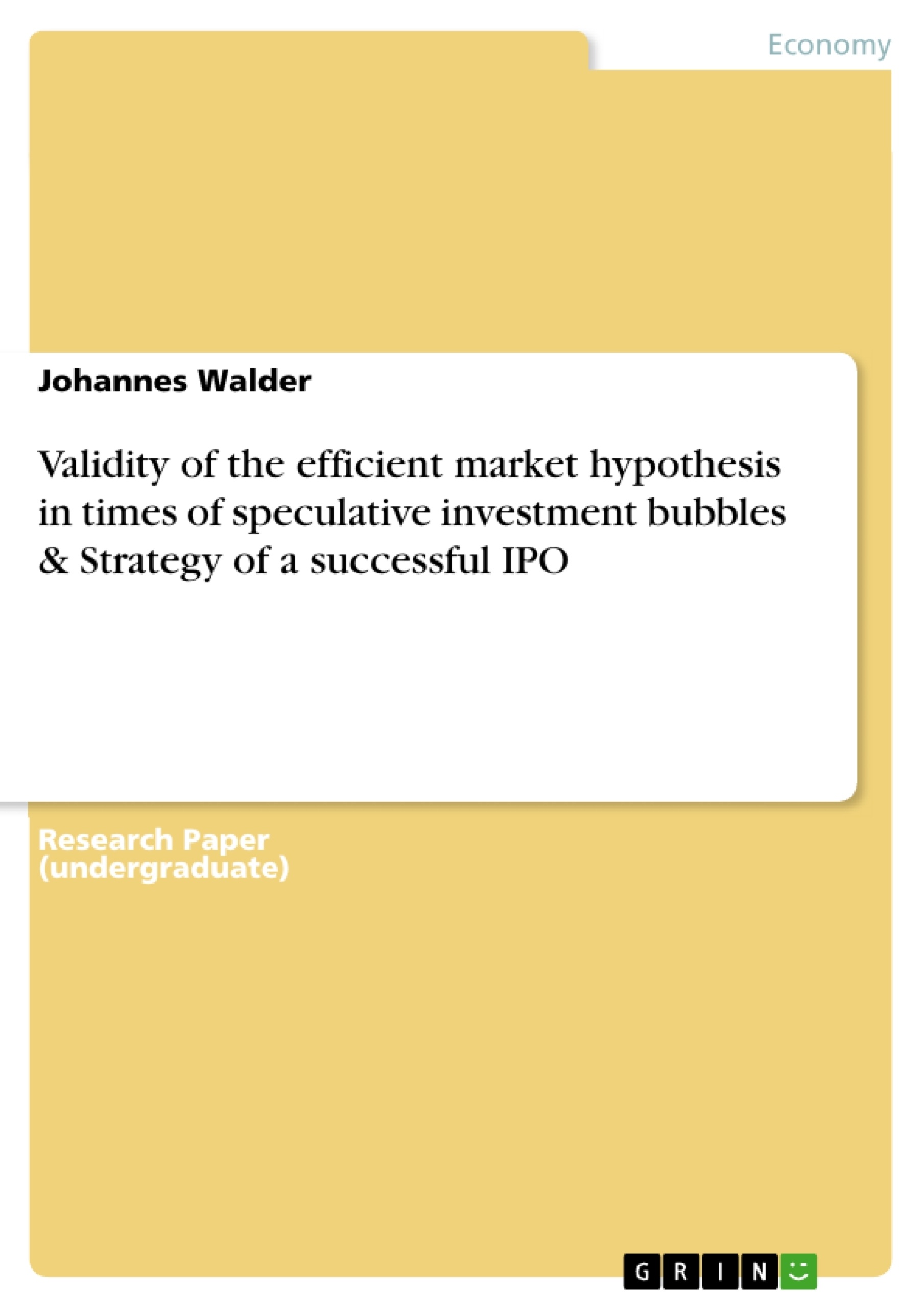Excerpt
I. Content
II. Abbreviations
III. Figures
1 Introduction
2 The efficient market hypothesis and their assumptions
3 Analysis of the dot.com bubble
3.1 The new economy
3.2 Factors leading to the dot.com bubble
3.3 The burst of the bubble
3.4 The dot.com bubble in historic perspective
4 Contradictions of the efficient market hypothesis in the face of speculative investment bubbles
5 Conclusion of the EMH evaluation
6 Strategy for a successful IPO
6.1 Preparation process
6.2 Due diligence
6.3 Marketing and investor relations
7 Conclusion of the IPO strategy analysis
References
Additional Reading
II. Abbreviations
illustration not visible in this excerpt
III. Figures
Figure 1: Ratio of Internet based IPOs compared to the total amount of IPOs
Figure 2: Underpricing of shares made visible by the average first day returns of IPOs from 1990 to 2009
1 Introduction
It can be assumed that the internet was one of the most influential inventions of the 20th century. The internet opened up completely new ways of communicating and executing businesses. It enabled shopping portals like Amazon or eBay to emerge and revolutionise the shopping experience of millions of customers worldwide. The new economy was a Symbol for seemingly endless possibilities and a market with no limits. However, all those new ways of doing business could not prevent one of the biggest stock market crashes in modern history caused by the dot.com bubble.
This essay examines if the dot.com bubble stands in contradiction to the efficient market hypothesis (EMH) and their underlying assumptions. It will be argued that in the short term the efficient market can be bypassed but it will regulate itself again in the long run.
The second part describes the strategy of a successful initial public offering (IPO) and analyses if the EMH has an impact on this endeavour. This paper will claim that the EMH influences the pricing of stocks and that a long term strategy is a key for a successful IPO.
2 The efficient market hypothesis and their assumptions
Pike and Neal (2009) acknowledge in their book three types of the EMH namely the weak form, the semi-strong from and the strong form.
The weak form states that share prices include all relevant information of the past. The semi-strong form of the EMH states that all currently publicly available information is reflected in the stock price and in the strong form all information, even if privately held is reflected. In all of these forms share prices react to news as soon as they get published. As news can be either bad or good, and as it is impossible to predict them, the stock price follows a random walk. Therefore, in the EMH it is impossible to beat the market by analysing past trends in order to predict future price movements. As a consequence for the investors profits are made by either luck, inside trade or by keeping a stock for a period of successive good news (Pike and Neal, 2009).
There are also several implications for the investees. Companies which plan to issue new shares often hesitate because they think their stocks are undervalued at the moment due to a “low” market. This however, does not exist in an efficient market. Unless they hold price sensitive information themselves, they should go ahead and issue the shares because the price is always accurate and fair (Samuel, Wilkes.and Brayshaw, 1995).
In the following this paper will take a critical look on the assumptions which the EMH is based upon. This essay will focus on the three most fundamental assumptions which are most commonly used in scientific research papers. The following counter arguments to the EMH assumptions are found in Yusupov and Lux (2007).
[...]
- Quote paper
- Johannes Walder (Author), 2012, Validity of the efficient market hypothesis in times of speculative investment bubbles & Strategy of a successful IPO, Munich, GRIN Verlag, https://www.grin.com/document/212375
Publish now - it's free






















Comments